
By Lori (Mom and Educator)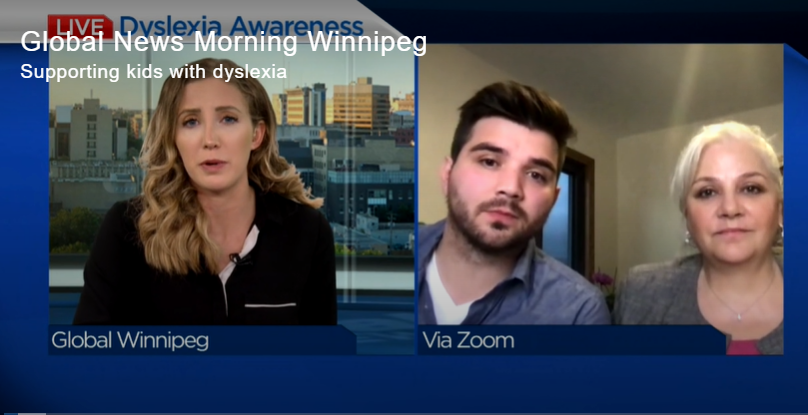
I spent many of my school years not feeling bright, and my peers and teachers had no idea how hard I had to work to be average. I always figured I just wasn’t that smart. However many years later when my kids began being diagnosed with dyslexia, it was then that I learned that I, too, had dyslexia. I had graduated from St. Mary’s Academy and went onto University where I continued to struggle, and it wasn’t until I was in the Creative Communications program at Red River College that things began to make sense for me.
I was working as the marketing director of Kildonan Place Shopping Centre when my first child was diagnosed. I began reading everything I could about dyslexia and quickly realized that this might also be the same issue my oldest son was struggling with. A psycho-educational report confirmed my suspicion. Then my youngest daughter began showing signs. She couldn’t remember the alphabet, she couldn’t remember colour names, she mixed up pronouns and would often say to me "Her going to school" instead of "She’s going to school.” A psycho-educational assessment confirmed that she also had dyslexia, and the psychologist then asked me if my husband and I had struggled learning to read to which I confirmed that we both had. My eldest daughter also had characteristics, but she had such an incredible memory that she just memorized everything. One could only really see her struggles when she spelled unknown words or read aloud. My middle child did not have any characteristics. He was reading Harry Potter books in grade 3. Before the diagnoses came in, I thought he was a genius. Then I learned that this is what learning to read is like for typical children.
I became frustrated with so many people I encountered including teachers, administrators and even my doctor. Finally I concluded that if anyone was going to help my children, it was going to have to be me. My husband and I decided that it would be best if I returned to university to learn everything I could to help our kids. I completed a Bachelor of Education, Post Baccalaureate in Education and a Master’s of Education. I hoped to become a reading clinician. You can imagine my disappointment when a reading clinician told me that dyslexia doesn’t exist. I went on to work very intensively with my children. I remember being at a mental health seminar and we had to write down what our hobbies were. I sat there thinking the only thing I do when I'm not helping my kids with school work, or being a mom to them is read about dyslexia. That was my life for many years.
But all five of my children went onto University and my youngest two are nearing the end of their degrees.
As I worked in the school system, I have seen many kids that had similar struggles to my own kids. I can confidently say that there is a lot of undiagnosed dyslexia out there.
******************
By Tommy Semchyshyn (Son)
I learned that I had dyslexia when I was in grade 2. I couldn’t read, and I was already beginning to feel like I was not as smart as the other kids. I had wonderful teachers who wanted to help me, but many weren’t quite sure how to do that. At St. Ignatius School, I met a wonderful lady named Mrs. van de Vijsel. She was learning about dyslexia and instructed my teachers and resource teacher in what they needed to do to help me. I did the Barton program for many years. I also worked with my mom a lot. By the time I started St. Paul’s High School, I knew what I needed to do to be successful in school, and I felt that I had a wonderful support system there. I never really felt that dyslexia held me back; although it did make school a lot harder for me. I played quarterback and when I was younger I had to write a R and L on my gloves because I did not have the time to think about which way I was going to run the play. In my grade 12 year, I was student council president, and I had to speak in front of the whole school. I also had to speak at a couple of events that had hundreds of people at. I was always a little nervous about public speaking, but only because I didn’t always pronounce words properly. In grade 12, I managed to graduate with honours and I won many leadership based scholarships including the Stacey Levitt Memorial National Scholarship, The Mayor’s Leadership Awards/scholarships including the Premier’s Healthy Living Award, Premier’s Youth Volunteer Award, and I was a finalist in the TD Canada Trust Leadership Award. I received my Bachelor of Arts from the University of Manitoba, and I am now completing my final year of my Bachelor of Education. And I’m still a slow reader!
See Global TV Interview here: http://globalnews.ca/video/8289436/supporting-kids-with-dyslexia
 Mark it Read 2021 Manitoba Events:
Mark it Read 2021 Manitoba Events:
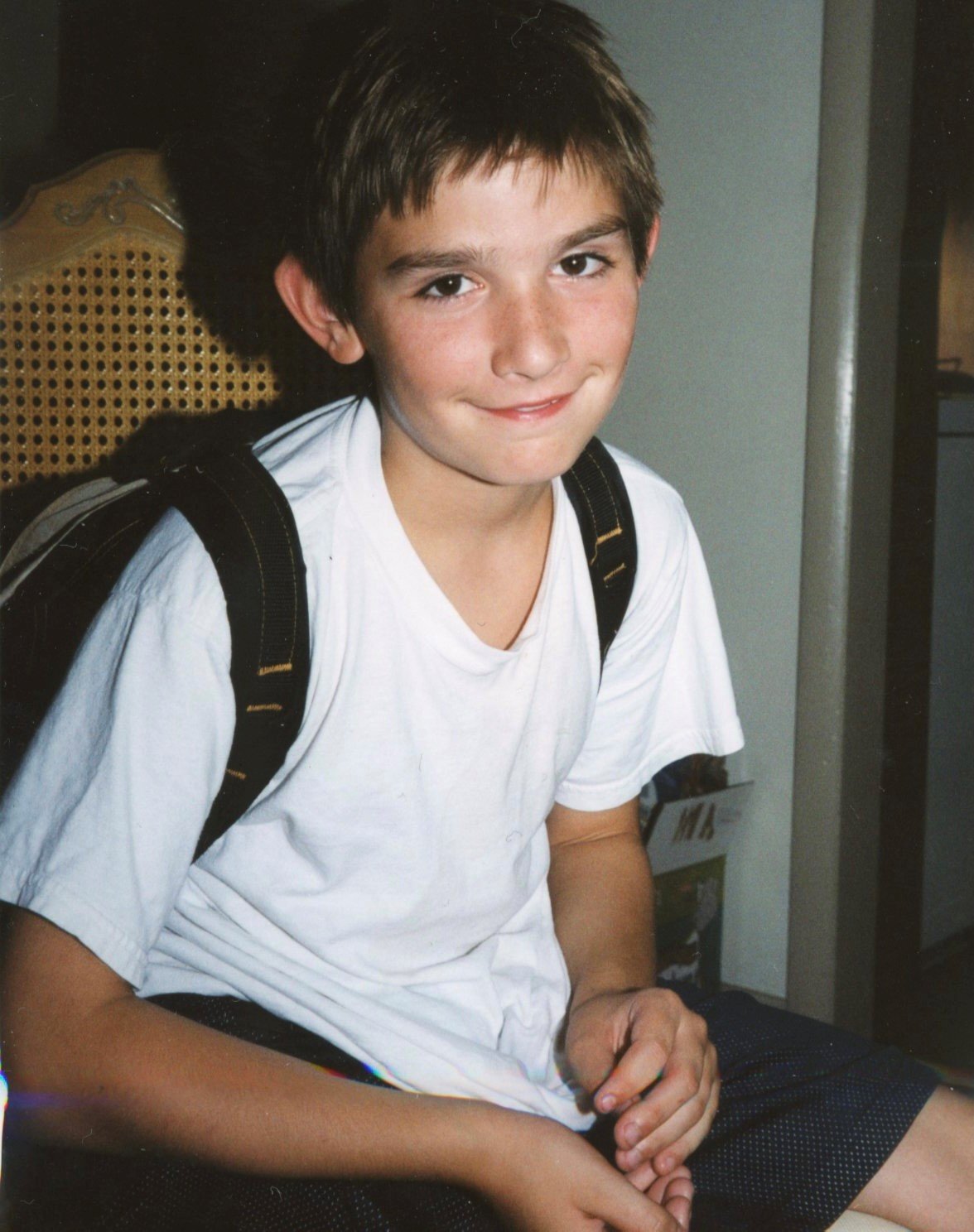 What makes a person successful? Is it when a person gets an A+ on a tough exam? Is it always knowing the answer when the teacher asks a question? Is it knowing the difference between left and right when your friend throws you a ball and tells you to go long in a specific direction? or is it when an athlete scores a touchdown to win the big football game? If these are what makes a person successful, then some would say that I am a failure.
What makes a person successful? Is it when a person gets an A+ on a tough exam? Is it always knowing the answer when the teacher asks a question? Is it knowing the difference between left and right when your friend throws you a ball and tells you to go long in a specific direction? or is it when an athlete scores a touchdown to win the big football game? If these are what makes a person successful, then some would say that I am a failure.
For many of my years in elementary and middle school, I thought that these characteristics were what made someone a champion and in doing so, I felt like a failure. I rarely succeeded in school during those years, and I often struggled with my schoolwork. I always had the messiest artwork, and had trouble reciting my alphabet, spelling, and cutting out shapes. By the time grade three approached, I was told that I was reading at a grade one level. I had trouble tying my shoes, but luckily I was charming enough to talk the girls in my class into tying my shoes for me. Despite my kindergarten teacher reassuring my parents that no one goes to junior high unable to tie their shoes, I did. When I was 13, I began to play football, and I still couldn’t tie my shoes. Unfortunately there was no cute girls on my football team, and I sure wasn’t going to ask one of the big offensive linemen to do it, so I’d often have to sneak out of the locker room before games to go find my mother to tie them for me.
Other aspects of education that I struggled with growing up included telling the difference between left and right, rhyming, reading, writing, penmanship and concerns with letter and sound connections. Due to these issues, many teachers believed that I was lazy, and some even suspected that I’d never graduate from high school. I was labeled as lazy, but they did not see the struggle I had in trying to read books or remember sequences. My classmates also labeled me as the “dumb kid” in the class, and over time I began to believe that I was “dumb.” When it came to group projects, I was often discriminated against in the class, as no one wanted “the dumb kid” in their group. This brought my confidence to an all time low, and I began to accept my fate as the “dumb kid.” I was destined to fail.
My fate quickly changed when I entered the fifth grade, and I met my new teacher, Charlie Siegel, who proved to be a catalyst for change. He looked past all the previous labels people had given me. I had a strong interest in creative writing and newspaper writing at this point in time, and he let me create and become editor of our class newspaper.
This was a huge risk as my teacher was letting the student who everyone labeled as dumb run a monthly class newspaper at the young age of ten. This was the first time that I felt like a leader to my peers. I was more confident than ever before, and it was all thanks to this one teacher for believing in me. I owe him a lot. If it were not for him, I may have never learned to believe in myself nor have graduated from high school.
The confidence that I had discovered in the fifth grade followed me into middle school, but middle school meant a whole new set of challenges, such as learning how to use a combination lock, exams, difficult course loads, and doing math without a calculator. My confidence began to quickly drop again and my parents, fresh from learning my younger brother had dyslexia, decided to send me to an educational psychologist to be assessed. I had seen specialists quite often during my early years, but it wasn’t until grade 8 that they discovered that I too had a learning disability. My parents sat me down and told me that I had dyslexia and my reaction to them was an incredulous, “so you mean I’m not dumb?”
For the majority of my life, I had felt stupid. I knew I was different from my peers, which made me feel that I was not as good as everyone else. My mom showed me a list of famous dyslexics, and I was surprised to see how many people I recognized on this list including Jay Leno, Albert Einstein, Tom Cruise, and Walt Disney. I felt that if these famous people could succeed despite their dyslexia, then I could too. I discovered that I had to take different approaches to learning. I am an auditory learner, which means I learn better through listening to a good speaker or through film.
Discovering I had dyslexia helped me gain self-confidence. As I was going through the assessment, I was also in the process of applying to St. Paul’s High School. I managed to work my way through the grueling entrance exam and got an interview. Going through the application process for St. Paul’s was no secret to my classmates, so during one of my basketball games, one of the other moms was asking my mom about the process. During this conversation, an eavesdropping mother in front of her turned around and looked my mother dead in the eye and said “Matthew is applying to St. Paul’s?! He will never get accepted there. St. Paul’s isn’t a place for a kid like him.” I was not about to let this rude, insignificant woman shake my confidence. Just because I had dyslexia, didn’t mean I couldn’t do things; it just meant I would have to work that much harder than everyone else.
I was accepted to St. Paul’s High School, where I was greeted with caring and supportive teachers. They allowed me to embrace my dyslexia, rather than hide from it. I was given permission to write my exams on a computer, so that I could organize my thoughts better and not have to deal with my fine motor difficulties. I was given more time on tests and exams, so that I could put more time and effort into my work. I was told that I was one of the first students with a known learning disability to be admitted to the school. During my time at St. Paul’s I was never an honour roll student, but that didn’t mean I didn’t succeed. I was given a lead role in a musical at St. Mary’s Academy where I was given the challenge of learning over thirty paragraphs to recite — quite the challenge for a kid who had trouble reciting the alphabet during my early years of education. In my senior year of high school, I was in Advanced Placement English. The “dumb kid” who was told might not make it to high school, who was at a grade one reading level in grade three, and struggled with writing, succeeded in Advanced Placement English and ended up with a mark in the 80s!
Being labeled as the dumb kid left a lot of scars. The interesting thing about scars though is that they’ll always be with you, but that doesn’t mean that they haven’t healed. In fact some of them make great stories.
Our society today is so based on success that we never really take a look at the scars of our failures and what they have to teach us. Life is often measured on how many times one fails and not on how they overcome that failure. When my favourite teacher, Charlie Siegel was retiring, I had the opportunity to publicly thank him for teaching me to overcome failures and learn from them, and part of my speech has stayed with me over the years:
Beethoven’s music teacher told him that he would never succeed as a composer. Walt Disney was fired from a newspaper because “he lacked imagination and had no good ideas.” Albert Einstein’s teacher told him that he was so stupid that he should quit school. Almost every publisher in Great Britain and the USA rejected J.K. Rowling’s book, Harry Potter. These people were all told they would amount to nothing; they were labeled as failures but they did not let these labels define them. They worked through their hardships and became some of the greatest success stories of all time.
I graduated with a Bachelor of Arts from the University of Manitoba. And now I work as the Marketing and Communications Officer at St. Paul’s College as well as the Manager of Operations for Tri-Star Technical Ltd.. I have researched and published a book, and I do freelance layout and design work.
My parents wouldn’t accept that I was “lazy” or “dumb” and worked with me tirelessly all through school. My parents made education a priority in our house. My mother even went back to university and did a B.Ed and M.Ed., so she could learn everything she could to help us overcome dyslexia. I was blessed to have the parents I have, and I know that I owe them a lot because without their faith in me, I would not have succeeded.
My mom has often said that she felt so guilty that no one had discovered that I had dyslexia before grade 8, but it’s not anyone’s fault. I am happy now. I am confident now. And every great epic has obstacles to get to the happy ending.
Did I ever get an A+ on a tough exam? Rarely. Did I always know the answer when teachers were to ask me a question? Sometimes. Did I learn to tie my shoes? Eventually. Did I graduate from High School? Yes. I may not consider myself your typical champion, but I am in no way a failure!
In celebration of Dyslexia Awareness Month, and the National Dyslexia Awareness Campaign – “Mark it Red/Read”, Jacob, a Grade 5 student at Stevenson-Britannia School decided it was time his peers learn about the challenges and the strengths his disability presents. On Thursday, October 24, Jakob gave a PowerPoint Presentation to his peers and their teachers.
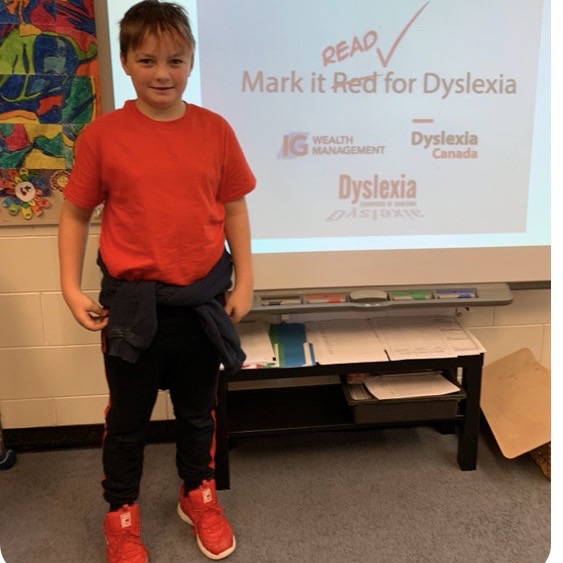
Jakob giving his PowerPoint Presentation to his classmates.
Jakob’s teacher Ms. Alisha Long and the Administration at Stevenson-Britannia School asked children to wear Red to school on October 24, 2019 in support of those students (estimated to be 10-20% of the population) who live with Dyslexia. The school was a sea of Red today!
When Jakob was asked why he is leading this important event in their school, he said that “As a child living with dyslexia, it is not an easy journey. This event is a chance for me to be the voice of many students with dyslexia. I want to raise awareness on dyslexia so people can understand what is dyslexia and to realize that we are the same as all the other children, it’s just that we learn differently”.
Jakob’s parents, Dustin and Julie said that “as parents, we couldn’t be prouder of Jakob to spread awareness on dyslexia and to recognize that this is not something to be embarrassed or ashamed of. He knows he has to work harder in order to read, write and spell. He takes on that challenge and we support him in every way we can”.
Miss Alisha Long, Jakob’s teacher, said that “I am so excited that Jakob has made himself into a positive advocate for people with dyslexia. I am very proud of him, and how passionate he is to share this important month with his classmates and the whole school.
Marilyn Mazzone (Jakob’s Tutor) said “Unfortunately, very few struggling readers are screened for dyslexia, and even when they are diagnosed with dyslexia, educators do not have the training to implement the type of reading instruction that works for, not only for these kids – but all students in the classroom. My hope is that these children can receive the instruction they need in the classroom. Jakob has made incredible progress in his reading and writing and I am so proud of him for being so brave to speak to his fellow students about his learning disability. He now recognized that dyslexia can be a gift, a unique strength that they have once they have learned how to work around it.”
Early identification/assessment of dyslexia and effective reading instruction are key to ensuring these children flourish in the school system.
Congratulations to our newest Dyslexia Champion - Jakob! We are all very proud of you!
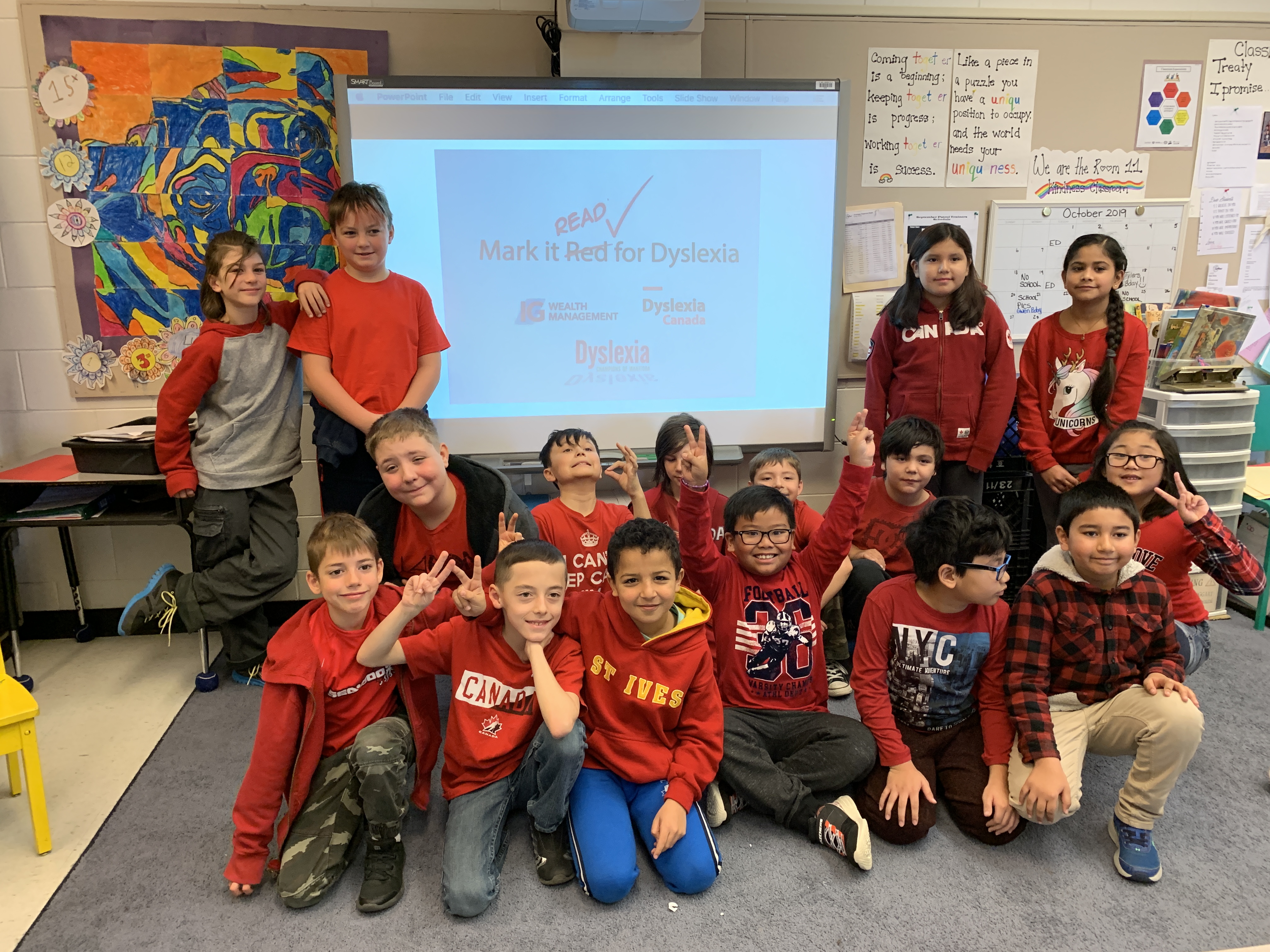
Jakob and his peers 'Marking it Red Read'
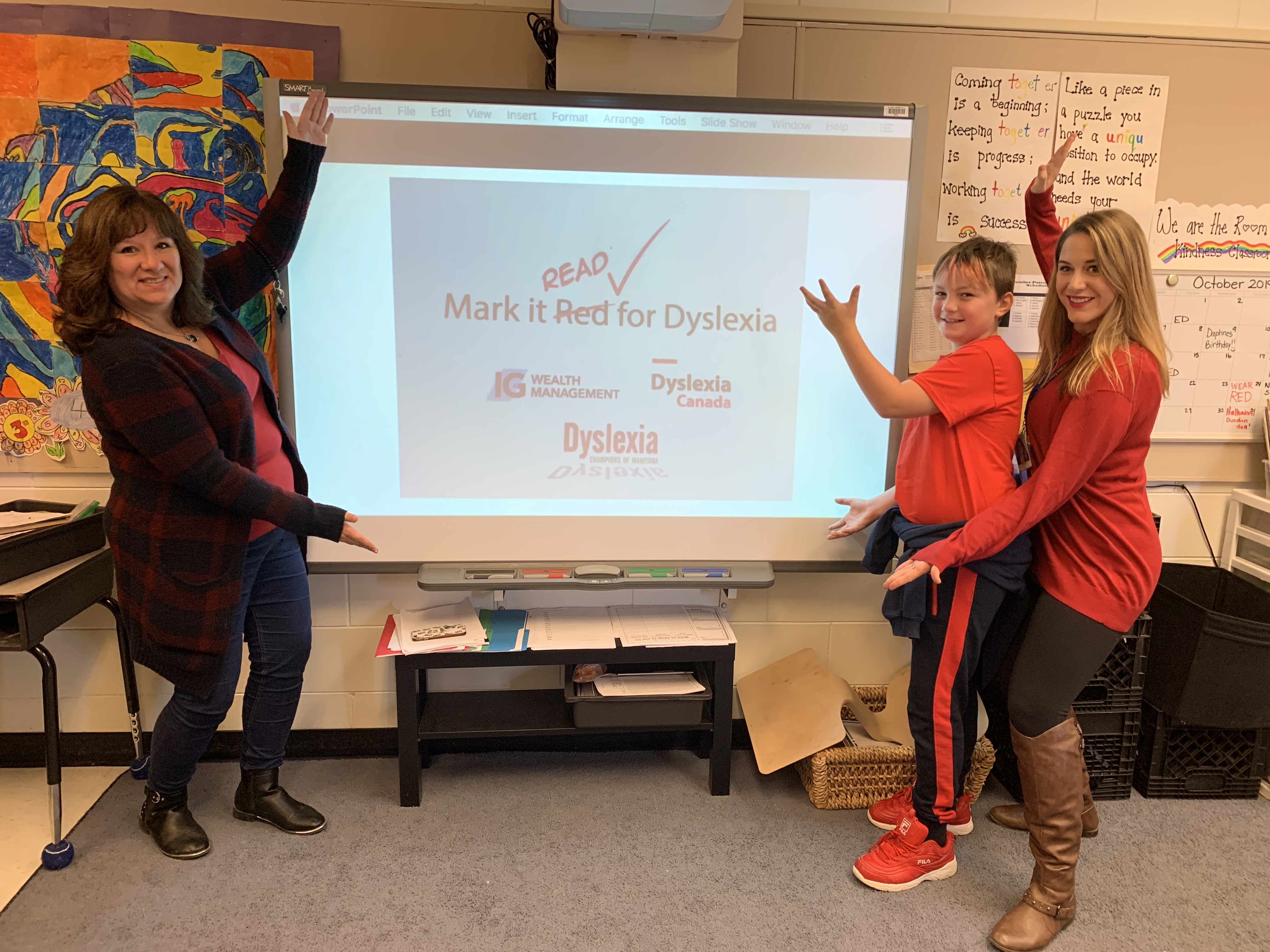
Jakob and his teachers
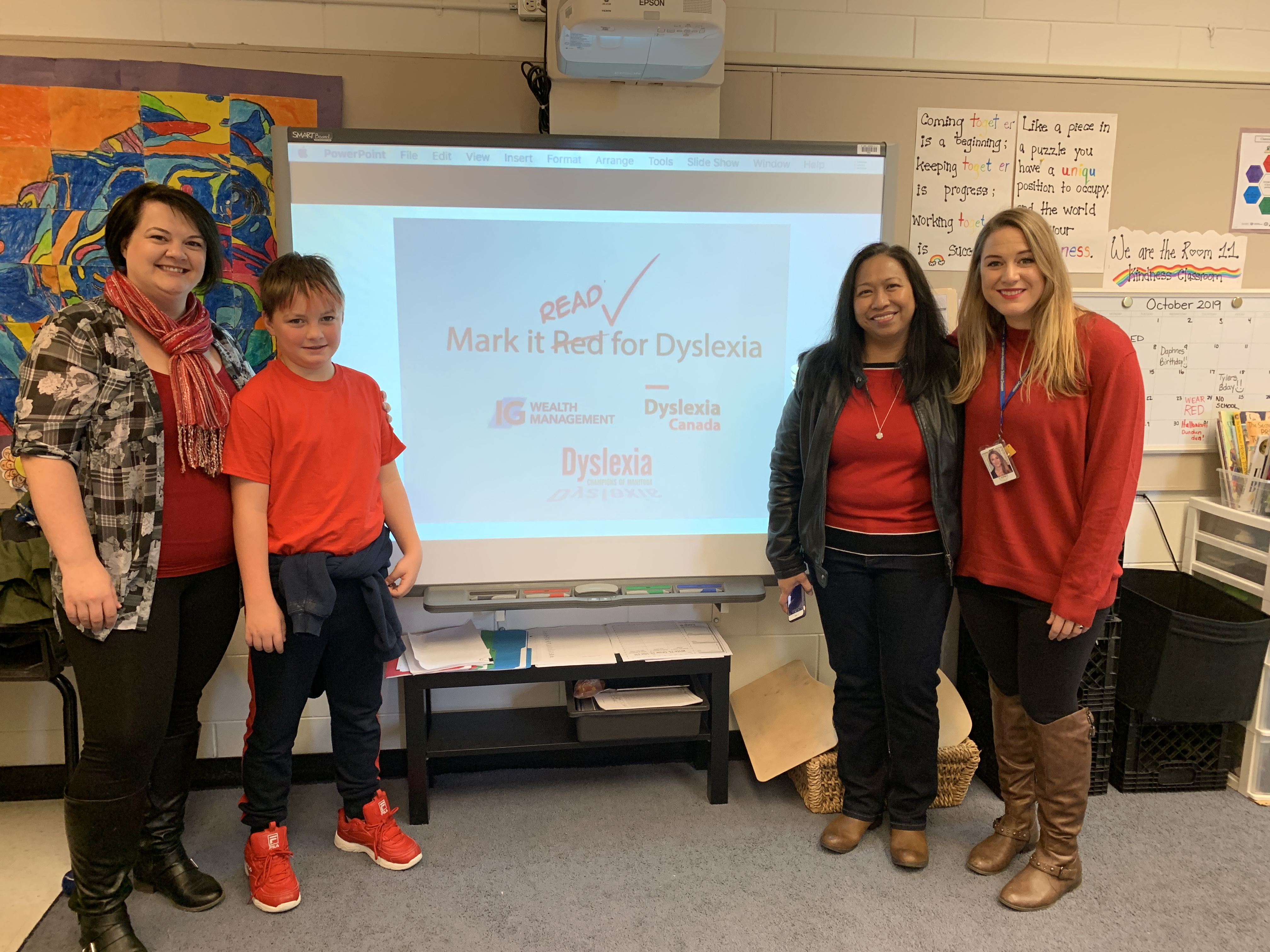
Jakob with his tutor, mother and teacher.
Congratulations to the Seine River School Division for putting on a training course for their Educational Assistants on 'Diverse Learners', as part of their
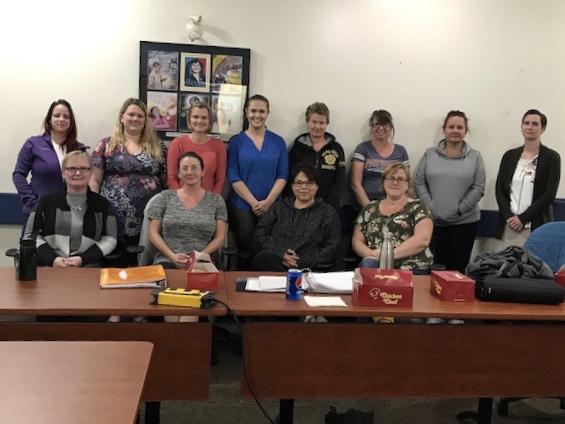
Educational Assistant Diploma course. The Dyslexia Champions of Manitoba were pleased to be asked to provide a presentation on Dyslexia to these students on October 17, 2019. Jeanne Remillard, Dyslexia Specialist and Student Services Coordinator in the Francophone School Division, delivered the presentation titled 'Dyslexia: The Invisible Disability'. Jeanne reported that there were many great questions, and the students were very interested in the topic.
The Dyslexia Champions look forward to partnering with other school divisions to help broaden awareness and knowledge about dyslexia.
September 2017
the BaTtLe
by Rachel Kraut
th SH. RrRrRr.
the sounds i make when i try to defeat my enemy
the letters are tricking me.
i FALL to the
the
ground i can’t defeat my worst nightmare alone
i need something…someone to fight this battle with me
In the distance I see the Queen of Words.
We fight the battle until the end.
We come out with victorious smiles on our face, screaming
“ We defeated the enemy – called DySLeXiA”!
October 2015
Success stories like Tiffany Sunday’s help parents see how diagnoses of dyslexia and dysgraphia do not limit a child’s potential. Tiffany is an author, speaker, and entrepreneur who is also raising an entrepreneurial son who has dyslexia.
When I was in third grade, I was diagnosed with dyslexia and dysgraphia. Few teachers were aware of dyslexia, and even fewer had training on how to help dyslexic students. I did not receive accommodations until my sophomore year of college.
My parents did not fully understand dyslexia. My mother was a teacher and did her best to help. School was not easy. I was always bouncing back from failure, defeats, and mistakes.
With each failure, I would think of a new way to learn. I developed strategies and work-around solutions to overcome the many obstacles I faced reading, writing, and spelling. With each challenge I encountered, another layer of resiliency was added. I refused to give up even when others doubted my abilities. As a result, I became very tenacious.
For example, I cannot process the sounds of languages. For me sounding out a word or reading a new word I have not heard is impossible.
I memorized or created unique stories or sayings to remember every spelling and vocabulary word. Memorizing the information helped developed my visual learning skills that were used to recall class discussions and notes written on the whiteboard. I still rely heavily on my visual skills today.
As a teen I had defined dreams and goals, which gave me the determination to move past the obstacles. These goals helped soften the embarrassment of misspelling words on the whiteboard for the whole class to see. To this day, as I write this article, spelling is difficult. I did not allow this weakness to prevent me from achieving my goal of becoming a published author.
School became easier in high school as I perfected my problem-solving and learning adaption strategies. My confidence increased as I had more opportunities to use my talents and strengths. One of my talents is public speaking—no spelling required! I volunteered to present our group projects instead of writing the report.
I met with the high school counselor and she told me to not to get my hopes up for the future. My SAT and ACT scores were low, and I knew my college entrance strategy would be different from my non-dyslexic friends. The summer semester following high school graduation, I took an English class at a community college so I could transfer the credit hours instead of the grade.
In the fall, I attended a small university and focused my efforts on attending Texas A&M University the following year. The summer between my freshman and sophomore year I attended summer school again and met with the A&M admissions director. He was impressed with my grades as compared to my low SAT and ACT scores. I was accepted and graduated with a B average.
After three years of corporate employment, I applied to Southern Methodist University (SMU) to obtain a master’s degree in business. I have a liberal arts undergraduate degree. Even with accommodations my GMAT score was rock bottom. SMU was a harder sell and after two rejection letters I convinced the admissions director to let me attend two semesters. If I maintained a 3.0 I would be accepted into the program. I met the requirement and obtained an MBA.
I knew I could obtain a degree if the school would just let me in!
With all the pain, frustration, and tears I would never trade my dyslexic brain. The ability to solve my own problems and learn to overcome failure has been invaluable to me as a business owner and entrepreneur.
Seth Goldman, co-founder of Honest Tea, stated in an article some of the prized traits of every entrepreneur most dyslexics acquire during school—“dealing with adversity, bouncing back from failure, seeing existing structures from a completely different perspective, and being persistent at finding solutions.”
Multiple academic studies continue to demonstrate the link between dyslexia and entrepreneurship with over 35% of the business owners being dyslexic. (Click here for a review of the research.)
As a teen, no one told me that my experiences as a dyslexic student would benefit me later in my career or even give me an competitive edge. Today, it is important to share this information with dyslexic teens—to let them know these traits and skills have value regardless if they become a business owner or not.
To help your teen learn more about dyslexic entrepreneurs and business ownership, search for articles online. Often a dyslexic business owner will discuss in an article how dyslexia helped him or her succeed in business and in life. The Dyslexic Advantage YouTube Channel is another good resource for interviews.
The most important thing to remember is each dyslexic person thinks and learns differently. We each have different strengths and talents. Brainstorm with your teen on how they can combine their innate talents, strengths, and dyslexic brain into a powerful asset.
I know from personal experience that when you are inside the thunderstorm it can be hard to see the silver lining and sunlight below the storm. When it feels like the rain will never end, remember it will. Each day, I tell my teen son, who is dyslexic, to have faith in his abilities, never settle, and, most importantly, never give up.
Tiffany Sunday is a TEDx Speaker, entrepreneur, and author of Dyslexia’s Competitive Edge and You Posted What!?
Copyright © 2015 International Dyslexia Association (IDA). We encourage sharing of Dyslexia Connection articles. If portions are cited, please make appropriate reference. Articles may not be reprinted for the purpose of resale. Permission to republish this article is available from info@interdys.org
What makes a person a champion? Is it when a person gets an A+ on a tough exam, or is it always knowing the answer when the teacher asks a question, or is it when an athlete scores a touchdown to win the big football game? If these are what makes a person a champion, then some would say that I am a failure.
For many of my years in elementary and middle school, I thought that these characteristics were what made someone a champion and in doing so, I felt like a failure. I rarely succeeded in school during those years, and I often struggled with my schoolwork. I always had the messiest artwork, and had trouble reciting my alphabet, spelling, and cutting out shapes. By the time grade three approached, I was told that I was at a reading level of a grade one student. I had trouble with tying my shoes and would charm the girls in my class so they would tie my shoes for me. Despite my kindergarten teacher reassuring my parents that no one goes to junior high unable to tie his shoes, I did. When I was 13, I began to play football and still couldn’t tie my shoes. Unfortunately there was no cute girls on my football team, and I sure wasn’t going to ask one of the big offensive linemen to do it, so I’d often have to sneak out of the locker room before games to go find my mother to tie them for me.
Other aspects of education that I struggled with growing up included telling the difference between left and right, rhyming, reading, writing and concerns with letter and sound connections. Due to these issues, many teachers believed that I was lazy, and some even suspected that I’d never graduate from high school. I was labeled as lazy, but they did not see the struggle I had in trying to read books or remember sequences. My classmates also labeled me as the “dumb kid” in the class, and over time I began to believe that I was “dumb.” When it came to group projects, I was often discriminated against in the class, as no one wanted “the dumb kid” in their group. This brought my confidence to an all time low, and I began to accept my fate as the “dumb kid.” I was destined to fail.
My fate quickly changed when I entered the fifth grade, and I met my new teacher, Charlie Siegel, who proved to be catalyst for change. He looked past all the previous labels people had given me. I had a strong interest in creative writing and newspaper writing at this point in time, and he let me create and become editor of our class newspaper.
This was a huge risk as my teacher was letting the student who everyone labeled as dumb run a monthly newspaper at the young age of ten. This was the first time that I felt like a leader to my peers. I was more confident than ever and it was all thanks to this one teacher for believing in me. I owe him a lot. If it were not for him, I may have never learned to believe in myself nor graduate from high school.
The confidence that I had discovered in the fifth grade followed me into middle school, but middle school meant a whole new set of challenges, such as learning how to use a combination lock, exams, difficult course loads, and doing math without a calculator. My confidence began to quickly drop again and my parents fresh from learning my younger brother had dyslexia decided to send me to a specialist to get some insight as to why I was struggling. I had seen specialists quite often during my early years, but it wasn’t until grade 8 that they discovered that I too had a learning disability. My parents sat me down and told me that I had dyslexia and my reaction to them was, “so you mean I’m not stupid.”
For the majority of my life, I had felt stupid. I knew I was different from my peers, which made me feel that I was not as good as everyone else. My mom showed me a list of famous dyslexics, and I was surprised to see how many people I recognized on this list including Jay Leno, Albert Einstein, Tom Cruise, and Walt Disney. I felt that if these famous people could succeed despite their dyslexia, then I could too. I discovered that being dyslexic didn’t mean that I couldn’t learn, it just meant that I had to take different approaches to learning. I am an auditory learner, which means I learn better through listening to a good speaker or through film.
Discovering I had dyslexia helped me gain self-confidence. As I was going through the assessment, I was also in the process of applying to St. Paul’s High School, a Catholic private school. I managed to work my way through the grueling entrance exam and got an interview. Me applying for St. Paul’s was no secret to my classmates, so during one my basketball games, my mother was discussing the application process with another parent. During this conversation, an eavesdropping mother in front of her turned around and looked my mother dead in the eye and said “Matthew is applying to St. Paul’s?! He will never get in. St. Paul’s isn’t a place for a kid like him.” I was not about to let this rude, insignificant woman shake my confidence. Just because I had dyslexia, didn’t mean I couldn’t do things; it just meant I would have to work that much harder to do them.
I was accepted to St. Paul’s High School, where I was greeted with caring and supportive teachers. They allowed me to embrace my dyslexia, rather than hide from it. I was given permission to write my exams on a computer so that I could organize my thoughts better and not have to deal with my fine motor difficulties. I was given more time on tests and exams, so that I could put more time and effort into my work. I was told that I was one of the first students with a known learning disability to be admitted to the school. During my time at St. Paul’s I was never an honor role student, but that didn’t mean I didn’t succeed. I was given a lead role in a musical at St. Mary’s Academy where I was given the challenge of learning over thirty paragraphs to recite — quite the challenge for a kid who had trouble reciting the alphabet during my early years of education. In my senior year of high school, I was in Advanced Placement English. The “dumb kid” who was told might not make it to high school, who was at a grade one reading level in grade three, and struggled with writing, succeeded in Advanced Placement English and ended up with a mark in the 80s!
When I was in the second grade, a girl punched me and knocked me out. I fell and smacked my head on a planter, and cut my face open. I had to get several stitches, and ended up looking like Sloth from The Goonies for a few weeks. However over time it healed, and all that is left from that fateful day is a little scar above my eye. Being labeled as the dumb kid left a lot of wounds at the time that have become scars. The interesting thing about scars is that they’ll always be with you, but that doesn’t mean that they haven’t healed, in fact some of them make great stories.
Our society today is so based on success that we never really take a look at the scars of our failures and what they have to teach us. However, Life is often measured on how many times you fail and overcome that failure. When my favourite teacher, Charlie Siegel was retiring, I had the opportunity to publically thank him for teaching me to overcome failures and learn from them, and part of my speech has stayed with me over the years:
Beethoven’s music teacher told him that he would never succeed as a composer. Walt Disney was fired from a newspaper because “he lacked imagination and had no good ideas.” Albert Einstein’s teacher told him that he was so stupid that he should quit school. Almost every publisher in Great Britain and the USA rejected J.K. Rowling’s book, Harry Potter.These people were all told they would amount to nothing; they were labeled as failures but they did not let these labels define them. They worked through their hardships and became some of the greatest success stories of all time.
Dyslexia is a gift. If you are struggling with dyslexia, keep on going. Don’t use it as an excuse to not do something, because with hard work and faith in yourself you can do anything. Don’t let others ruin your confidence. Dyslexics have a unique outlook on the world. Just like how we learn differently, we see things differently. We are the future success stories of the world.
My advice to parents who are worrying about their kids with dyslexia is to believe in your children. They will get through this. If you are feeling guilty about not discovering your child had dyslexia sooner, you need to stop beating yourself up about it. You discovered it now, and all you can do is continue to support your children. My parents wouldn’t accept that I was “lazy” or “dumb” and worked with me tirelessly all through my struggles. I was blessed to have the parents I have, and I know that I owe them a lot because without their faith in me. I would not have succeeded. My mom has often said that she felt so guilty that no one had discovered that I had dyslexia sooner, but it’s not anyone’s fault. I am happy now. I am confident now. Every great epic has obstacles to get to the happy ending.
Did I ever get an A+ on a tough exam? Rarely. Did I always know the answer when teachers were to ask me a question? Sometimes. Did I learn to tie my shoes? Eventually. Did I graduate from High School? Yes. In fact I recently just graduated from University and I’m now pursuing a career in both film and education. I spent a year as the Senior Stick (Student Council President) of St. Paul’s College, where I was able to re-launch a college newspaper, co-organize a quarter of a million dollar renovation, as well as many other successful projects. This June, I spent a few weeks working as an Educational Assistant where I had the opportunity to prepare struggling learners for their exams. I was elated with their success because it was not all that long ago that I was in their shoes. If all goes as planned, I hope to one day be back in the classroom as a teacher where I can be a Charlie Siegel to kids who need someone who will believe in them.
I may not consider myself your typical champion, but I am in no way a failure!
Thanks for wanting to sign up! Please enter your name and verify your email address below.